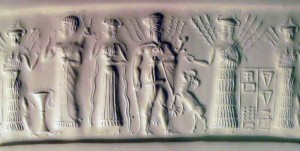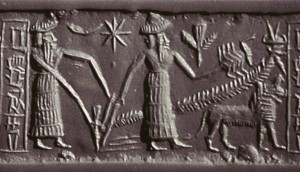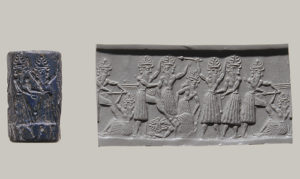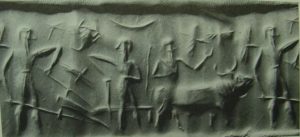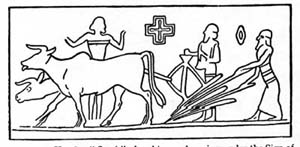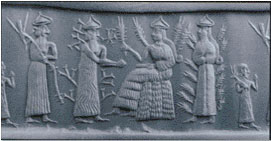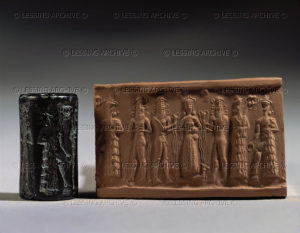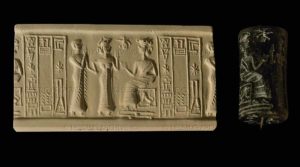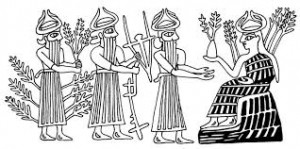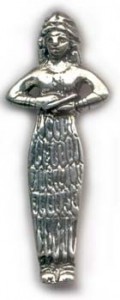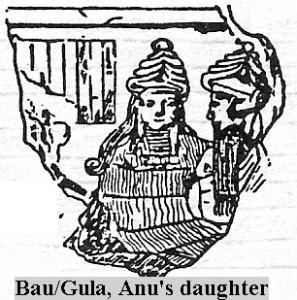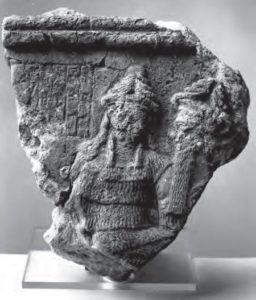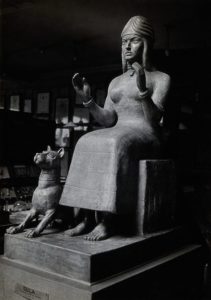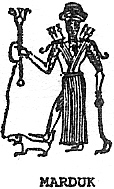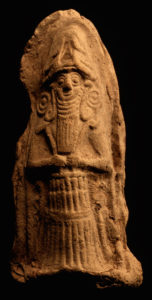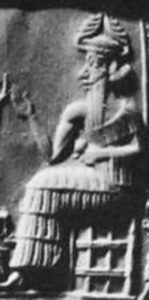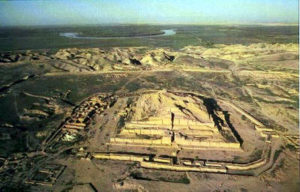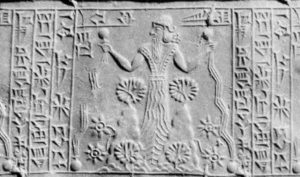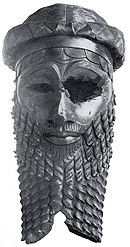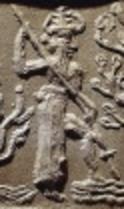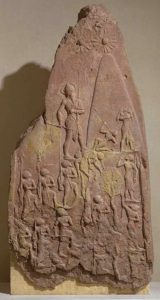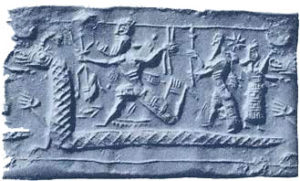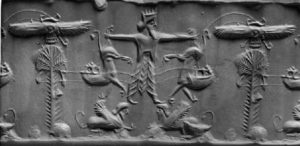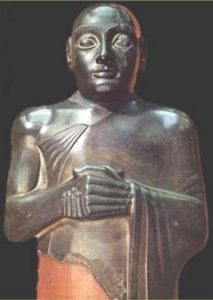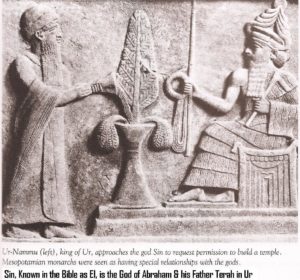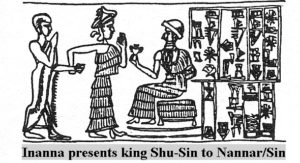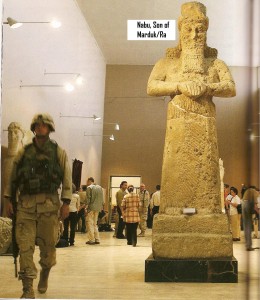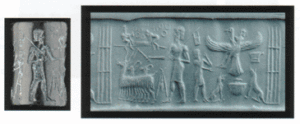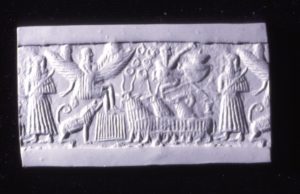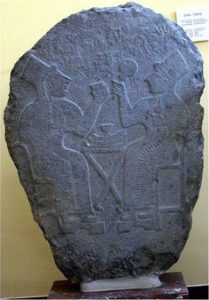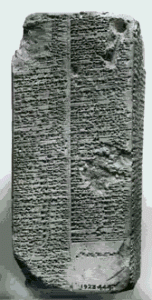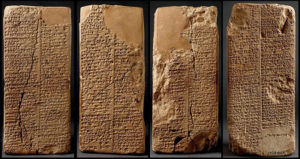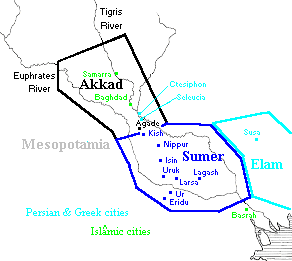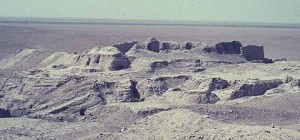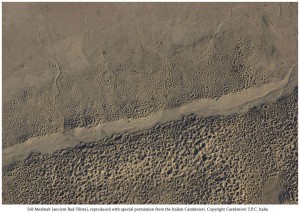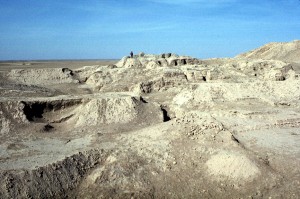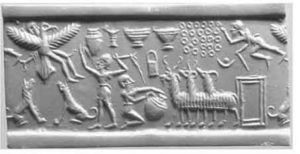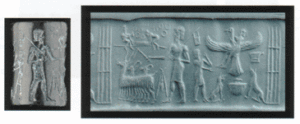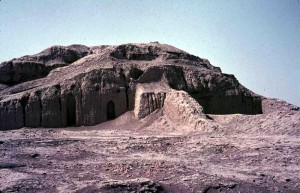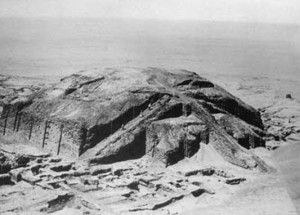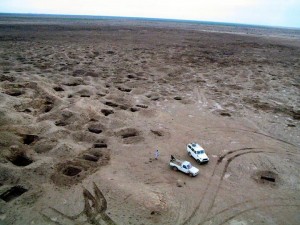prior to the Anunnaki coming to Earth
(Texts: All Artifacts, Color Coding, & Writings in Bold Type With Italics Inside Parenthesis, are Added by Editor R. Brown, not the Authors, Translators, or Publishers!)
(gods in blue)
Quotes From Zecharia Sitchin Books
SEE SITCHIN’S EARTH CHRONICLES, ETC.:
According to “The Lost Book Of Enki”:
Sitchin states:
“After many shars of warring between the nation of the north and the nation of the south, and after insurmountable destruction to the planet and to life on Nibiru, and after most of the men had perished in the war, a truce was declared. A peaceful settlement was reached by uniting the planet under one king. By lots a unifying leader was to be selected. If the winner was from the south, then he would take a wife from the north. If the winner was from the north, then his spouse would be chosen from the south, thus uniting the interests of the people from all the lands. A royal throne for the entire planet was then established.”
1st king
An – meaning the “Celestial One”
. A warrior from the north
. His ruling city was built and named Agade, meaning “Unity”
. Married An.Tu meaning the “Leader Who Is An’s Spouse”, from the south
. They had three sons and no daughters
According to “The Lost Book of Enki”:
“Now this is the account of the Prior Times,
and the Weapons of Terror.
Before the Prior Times was the Beginning;
after the Prior Times were the Olden Times.
In the Olden Times the gods came to Earth
and created the Earthlings.
In the Prior Times, none of the gods was on the Earth,
nor were the Earthlings yet fashioned.
In the Prior Times, the abode of the gods was on their own planet;
Nibiru is its name.
A great planet, reddish in radiance;
around the Sun an elongated circuit Nibiru makes.
For a time in the cold is Nibiru engulfed;
for a part of its circuit by the Sun strongly is it heated.
A thick atmosphere Nibiru envelops,
by volcanic eruptions constantly fed.
All manner of life this atmosphere sustains;
without it there will be only perishing!
In the cold period the inner heat of Nibiru it keeps about the planet,
like a warm coat that is constantly renewed.
In the hot period it shields Nibiru from the Sun’s scotching rays.
In its midst rains it holds and releases,
to lakes and streams giving rise.
Lush vegetation our atmosphere feeds and protects;
all matter of life in the waters
and on the land to sprout it caused.
After aeons of time our own species sprouted,
by our own essence an eternal seed to procreate.
As our numbers grew,
to many regions of Nibiru our ancestors spread.
Some tilled the land, some four-legged creatures shepherded.
Some lived on the mountains, some in the valleys their home made.
Rivalries occurred, encroachments happened;
clashes occurred, sticks became weapons.
Clans gathered into tribes,
then two great nations each other faced.
The nation of the north against the nation of the south took up arms.
What was held by hand to thrusting missiles was turned;
weapons of thunder and brilliance increased the terror.
A war, long and fierce, engulfed the planet;
brother amassed against brother.
There was death and destruction for both north and south.
For many circuits desolation reined the land;
all life was diminished.
Then a truce was declared; then peacemaking was conducted.
Let the nations be united, the emissaries said to one another:
Let there be one throne on Nibiru, one king to reign over all.
Let a leader from north or from south by lot be chosen,
one king supreme to be.
If he be from north,
let south choose a female to be his spouse
as equal queen to reign alongside.
If by lot a south male be chosen,
let the north’s female be his spouse.
Husband and wife let them be, as one flesh to become.
Let their first born son be the successor;
let a unified dynasty thus be formed,
unity on Nibiru forever to establish!
In the midst of the ruins, peace was started.
North and south by marriage were united.
The royal throne into one flesh combined,
an unbroken line of kingship established!
The first king after peace was made,
a warrior of the north he was, a mighty commander.
By lots, true and fair, was he chosen;
his decrees in unity were accepted.
For his abode he built a splendid city;
Agade, Unity meaning, was its name.
For his reign a royal title he was granted;
An it was, the Celestial One was its meaning.
With strong arm order in the lands he re-established;
laws and regulations he decreed.
Governors for each land he appointed;
restoration and reclamation was their foremost task.
Of him in the royal annals, thus it was recorded:
An the lands unified, peace on Nibiru he restored.
He built a new city, the canals he repaired,
food to the people he provided;
there was an abundance in the lands.
For his spouse the south a maiden had chosen;
for both love and warring she was noted.
An.Tu was her royal title; the Leader Who Is An’s Spouse,
the given name cleverly did mean.
She bore An three sons and no daughters.”
2nd king
An.Ki – meaning “By a Solid Foundation”
. Eldest son and heir of An’s
. Never married, concubines didn’t produce any sons
. No heirs were produced
. After his death, kingship fell to his younger brother
According to “The Lost Book of Enki”:
“The first born son was by her named An.Ki;
By An a solid foundation was its meaning.
Alone on the throne he was seated;
a spouse to choose was twice postponed.
In his reign, concubines were brought into the palace;
a son to him was not born.
The dynasty thus begun was by the death of Anki disrupted;
on the foundation no offspring followed.”
3rd king
Ib – meaning “The One in the Middle”
. 2nd son to An and An.Tu
. Re-named An.Ib meaning “The One Who Is An’s Son” when he became king
. Married Nin.Ib meaning the “Lady of Ib”, his younger brother’s
daughter
According to “The Lost Book of Enki”:
“The middle son, though not the first born,
the Legal Heir was pronounced.
From his youth, one of the tree brothers,
Ib by his mother was lovingly called.
The One In The Middle his name did mean.
By the royal annals An.Ib he is named:
In kingship celestial; by generations,
the One Who Is An’s Son the name signified.
He followed his father An on Nibiru’s throne;
by count he was the third to reign.
The daughter of his younger brother he chose to be his spouse.
Nin.Ib she was called, the Lady of Ib.”
4th king
An.Shar.Gal – meaning “An’s Prince Who Is Greatest of Princes”
. 1st son of Anib and Ninib
. Married Ki.Shar.Gal, his half-sister, both offspring of the king Anib
. 1st son of Anshargal’s was born by a concubine
. 2nd son of Anshargal’s was born by his official wife and half-sister, Kishargal
.Kishargal had Anshargal proclaim that the legal heir to the throne be the 1st son born of the “double seed” of royal blood, not necessarily just the first son born, thus establishing for all time the “Law of the Seed”.
According to “The Lost Book of Enki”:
“A son to Anib by Ninib was born;
the successor on the throne he was,
the fourth by the count of kings.
By the royal name An.Shar.Gal he wished himself to be known;
An’s Prince Who Is Greatest Of Princes was the meaning.
His spouse, a half sister, Ki.Shar.Gal was equally named.
Knowledge and understanding were his chief ambition;
the ways of the heavens he assiduously studied.
The great circuit of Nibiru he studied;
its length a Shar to be he fixed.
As one year of Nibiru was the measure,
by it the royal reigns to be numbered and recorded.
The Shar to ten portions he divided,
two festivals thereby he pronounced.
When nearest to the Sun’s quarters,
a festival of the warmth was celebrated.
When to its far abode Nibiru was distanced,
the festival of coolness was decreed.
Replacing all olden festivals of tribes and nations,
to unify the people the two were established.
Laws of husband and wife, of sons and daughters,
by decree he established;
Customs from the first tribes he proclaimed for the whole land.
From the wars females greatly outnumbered males.
Decrees he made, one male to have more than one female for knowing.
By law one wife as official spouse to be chosen,
First Wife to be called.
By law, the first born son was his father’s successor.
By these laws, confusion soon came about;
if the Firstborn son not by the First Wife was born,
And thereafter by the First Wife a son was born,
by law the Legal Heir becoming.
Who shall be the successor:
the one by the count of Shar’s firstborn?
The one by the First Wife born?
The Firstborn son? The Legal Heir?
Who shall inherit? Who shall succeed?
In the reign of Anshargal,
Kishargal as First Wife was pronounced.
A half sister of the king she was.”
5th king
An.Shar
. 1st son of Anshargal and Kishargal
. Married Ki.Shar, his half-sister, both the offspring of Anshargal.
. Nibiru’s climate was bitter cold when it was away from the sun, and horribly hot as it approached the sun. Nibiru’s atmosphere was collapsing. Famine and hardship spread across Nibiru.
. A breach in the atmosphere was discovered. Air was escaping and becoming thinner. Volcanic activity had greatly lessened, emitting fewer gases, and causing the air to cool.
According to “The Lost Book of Enki”:
“In Anshargal’s reign,
concubines were again brought into the palace.
By the concubines, sons and daughters to the king were born.
A son by one was the first to be born;
the son of a concubine was the Firstborn.
Thereafter Kishargal bore a son.
The Legal Heir by law was his; the Firstborn he was not.
In the palace Kishargal raised her voice, in anger shouting:
If by rules my son, by a First Wife born,
from succession shall be barred,
Let the double seed not be neglected!
Though of different mothers,
of one father the king and I are offspring.
I am the king’s half sister, of me the king is half brother.
By that my son the double seed of our father Anib possesses!
Let henceforth the Law of the Seed,
the Law of Espousal overpower!
Let henceforth a son by a half sister,
whenever born, above all other sons rise to succession!
Anshargal, contemplating, the Law of the Seed embraced with favor:
Confusion of spouse and concubines,
of marriage and divorce, by it would be avoided.
In their council, the royal counselors
the Law of the Seed for succession adopted.
By the king’s order, the scribes the decree recorded.
Thus, the next king by the Law of the Seed for succession was proclaimed.
To him the royal name An.Shar was granted.
Fifth on the throne he was.
Now this is the account of the reign of Anshar
and the kings who followed.
When the law was changed,
the other princes were contending.
Words there were, rebellion there was not.
As his spouse Anshar a half sister chose.
He made her First Wife; by the name Ki.Shar she was called.
Thus was by this law the dynasty continued.
In the reign of Anshar, the fields diminished their yields,
fruits and grains lost abundance.
From circuit to circuit, nearing the Sun heat grew stronger;
in the faraway abode, coolness was more biting.
In Agade, the throne city,
the king those of great understanding assembled.
Learned savants, those of great knowledge,
to inquire were commanded.
The land and the soil they examined,
the lakes and streams they put to the test.
It has happened before, some gave an answer:
Nibiru in the past colder or warmer has grown;
A destiny it is, in the circuit of Nibiru embedded!
Others of knowledge, the circuit observing,
Nibiru’s destiny to blame did not consider.
In the atmosphere a breaching has occurred;
that was their finding.
Volcanoes, the atmosphere forbears;
less belching were spitting up!
Nibiru’s air has thinner been made,
the protective shield has been diminished!
In the reign of Anshar and Kishar,
pestilence of field made appearance;
toil could them not overcome.”
6th king
En.Shar – meaning “Lordly Master of the Shar”
. 1st son of Anshar and Kishar
. Married his half-sister, Nin.Shar – meaning “of the Shars the Lady”
. Ninshar produced no male heir, so one came by way of a concubine
. He became very learned in Nibiru’s circuit and the atmospheres of the five outer planets. He named the planets after his forefathers.
. He sent teams of scientists in spaceships to study the five planets
. He studied why the volcanoes weren’t belching the much needed atmospheric gases, and thus not releasing any warmth. Things were getting worse.
According to “The Lost Book of Enki”:
“Their son En.Shar then the throne ascended;
of the dynasty the sixth he was.
Lordly Master of the Shar the name did signify.
With great understanding he was born,
with much learning he mastered much knowledge.
To remedy the afflictions ways he sought,
of Nibiru’s heavenly circuit he made much study.
In its loop, of the Sun’s family five members it embraced,
planets of dazzling beauty.
For cures to the afflictions,
their atmospheres he caused to be examined.
To each he gave a name, ancestral forefathers he honored;
as heavenly couples he them considered.
An and Antu, the twinlike planets,
he called the first two to be encountered.
Beyond in Nibiru’s circuit were Anshar and Kishar,
in their size the largest.
As a messenger Gaga among the others coursed,
sometimes first Nibiru to meet.
Five in all were Nibiru’s heavenly greeters as the Sun it circled.
Beyond, like a boundary,
the Hammered Bracelet the Sun encircled;
As a guardian of the heaven’s forbidden region
with havoc it protected.
Other children of the Sun, four in number,
from intrusion the bracelet shielded.
The atmospheres of the five greeters Enshar set out to study.
In its repeating circuit,
the five in Nibiru’s loop carefully were examined.
What atmospheres they possessed by observation
and with celestial chariots intensely were examined.
There findings were astounding, the discoveries confusing.
From circuit to circuit Nibiru’s atmosphere more breaching suffered.
In the councils of the learned, cures were avidly debated;
ways to bandage the wound were urgently considered.
A new shield to embrace the planet was attempted;
all that was thrust up back to the ground came down.
In the councils of the learned,
the belching volcanoes were studied.
The atmosphere by belching volcanoes having been created,
its wound by their diminished belching had come to be.
Let with invention new belching be encouraged,
let volcanoes spew again! one savants group was saying.
Hoe the feat to achieve, with what tools more belching to attain,
none the king could inform.
In the reign of Enshar the breach in the skies grew bigger.
Rains were withheld, winds blew harder;
springs from the depths did not rise.
In the lands there was an accursation;
the breasts of mothers were dry.
In the palaces there was distress;
an accursation therein took hold.
As his First Wife, Enshar a half sister did espouse,
by the Law of the Seed abiding.
Nin.Shar she was called, of the Shars the Lady.
A son she did not bear.”
7th king
Du.Uru – meaning “In the Dwelling Place Fashioned”
. 1st son of Enshar and a concubine – the “double seed” is broken!
. Married Da.Uru, meaning “She Who is by My Side”,
. He married for love, not by blood relation – the bloodline is broken!
. They and many others were now infertile due to Nibiru’s enduring hardships
. They found a son at the gate and adopted him as heir – all royal bloodlines of Nibiru are now broken!
According to “The Lost Book of Enki”:
“By a concubine to Enshar a son was born;
the Firstborn son he was.
By Ninshar, First Wife and half sister,
a son was not brought forth.
By the Law of Succession, the concubine’s son the throne ascended;
the seventh to reign he was.
Du.Uru was his royal name;
In the Dwelling Place Fashioned was its meaning;
In the House of Concubines,
not in the palace, was he indeed conceived.
As his spouse a maiden from his youth beloved Duuru chose;
by love, not by seed, a First Wife he selected.
Da.Uru was her royal name;
She Who Is By My Side was the meaning.
In the royal court confusion was rampant.
Sons were not heirs, wives were not half sisters.
In the land suffering was increasing.
The fields forgot their abundance,
among the people fertility was diminished.
In the palace fertility was absent;
neither son nor daughter was brought forth.
Of An’s seed, seven were the rulers;
then of his seed the throne was dry.”
8th king
Lahma – meaning “Dryness”
. Adopted son of Duuru and Dauru’s, married Lahama
. He was not well accepted by those in the royal palace as an heir with no bloodlines from the original king An
. Nibiru’s problem was to be solved by getting gold to repair the atmosphere, and or to blast the volcanoes with nuclear weapons, he could decide to do nothing
. Revolt arose against him lead by Alalu, a prince
. Alalu and Lahma fought, Alalu threw Lahma off a tower to his death!
According to “The Lost Book of Enki”:
“Dauru a child at the palace gateway found;
as a son she embraced him.
Duuru in the end as a son he adopted,
Legal Heir him decreed;
Lahma, meaning Dryness, was his given name.
In the palace the princes were grumbling;
in the Council of Counselors there were complaints.
In the end Lahma the throne ascended.
Though not of An’s seed, he was the eighth to reign.
In the councils of the learned,
to heal the breach there were two suggestions:
One was to use a metal, gold was its name.
On Nibiru it was greatly rare;
within the Hammered Bracelet it was abundant.
It was the only substance that to the finest powder could be ground;
lofted high in heaven, suspended it could remain.
Thus, with replenishments,
the breach it would heal, protection make better.
Let celestial boats be built,
let a celestial fleet the gold to Nibiru bring over!
Let the Weapons of Terror be created!
Was the other suggestion;
weapons that the ground shook loose,
the mountains split asunder;
With missiles the volcanoes to attack,
their dormancy to bestir, their belching to increase,
The atmosphere to replenish, the breach to make disappear!
For a decision Lahma was too feeble;
what choice to make he knew not.
One circuit Nibiru completed,
two Shars Nibiru to count continued.
In the fields, affliction was not diminished.
By the volcanic belching the atmosphere was not repaired.
A third Shar passed, a fourth was counted.
Gold was not obtained.
In the land strife was abundant;
food and water were not abundant.
In the land unity was gone; accusations were abundant.
In the royal court, savants were coming and going;
counselors were rushing in and rushing out.
The king to their words paid no attention.
Counsel from his spouse he only sought; Lahama was her name.
If destiny it be, let us beseech the Great Creator of All,
to the king she said.
Beseeching, not acting, provide the only hope!
In the royal court the princes were astir;
at the king accusations were directed:
Foolishly, unreasoning, greater calamities instead of cure he brought forth!
From the olden storehouses, weapons were retrieved;
of rebellion there was much speaking.”
9th king
Alalu
. Alalu was brought before the “Seven Who Judge”
. He claimed to be a descendant of the past king, Anshargal and a concubine’s son named Alam; his claim was rivaled by another prince named Anu.
.Anu was descended by his great ancestor, and Nibiru’s 1st king, An, by way of An’s third son, Enuru
.The two agreed that Alalu would keep the throne, but Anu would be his successor
. Alalu’s daughter, Damkina was to marry Anu’s son, Enki to meld their bloodlines for future royal heirs – all agreed
. Alalu sent men to mine gold from the “Hammered Bracelet”, Asteroid Belt but all were killed trying to land; he sent nuclear missiles into the volcanoes to no avail
. After 9 shars of reign, Anu challenged Alalu to a wrestling match for the throne and won. Alalu feared for his life and bolted for Earth to hide.
According to “The Lost Book of Enki”:
“A prince in the royal palace was the first to take up arms.
By words of promise, the other princes he agitated;
Alalu was his name.
Let Lahma be the king no more! He shouted.
Let decision supplant hesitation!
Come, let us unnerve the king in his dwelling;
let him the throne abandon!
The princes to his words gave heed;
the gate of the palace they rushed;
To the throne room, its entrance restricted,
like onrushing waters they went.
To the tower of the palace the king escaped;
Alalu was him pursuing.
In the tower there was a struggle;
Lahma fell to his death.
Lahma is no more! Alalu said.
The king is no more, with glee he announced.
To the throne room Alalu rushed,
on the throne he himself seated.
Without right or council, a king he himself pronounced.
In the land unity was lost;
some by the death of Lahma rejoiced,
others by Alalu’s deeds were saddened.
Now this is the account of the kingship of Alalu
and of the going to Earth.
In the land unity was lost;
about the kingship many were aggrieved.
In the palace princes were agitated;
in the council, counselors were distraught.
From father to son, succession from An on the throne continued;
Even Lahma, the eighth, by adoption a son was proclaimed.
Who was Alalu? Was he a Legal Heir? Was he Firstborn?
By what right did he usurp; was he not a king’s slayer?
Before the Seven Who Judge Alalu was summoned,
his fate to consider.
Before the Seven Who Judge, he spread his pleas:
Though neither Legal Heir nor a son Firstborn,
of royal seed indeed he was!
Of Anshargal am I descended, before the judges he claimed.
By a concubine, my ancestor was to him born; Alam was his name.
By the court of Shars, Alam was the Firstborn;
the throne to him belonged;
By conniving, the queen his rights put aside!
A Law of the Seed from naught she created,
for her son the kingship obtained.
Alam of kingship she deprived; to her son it was granted.
By descent, of Alam’s generations am I continued;
the seed of Anshargal is within me!
The Seven Who Judge to Alalu’s words gave heed.
To the Council of Counselors they passed the matter,
the truth or falsehood to ascertain.
The royal annals from the House of Records were brought forth;
with much care they were read.
An and Antu the first royal couple were;
three sons and no daughters to them were born.
The Firstborn was Anki; he died on the throne;
he had no offspring.
The middle son in his stead the throne ascended; Anib was his name.
Anshargal was his Firstborn; the throne he ascended.
After him on the throne kingship by the Firstborn did not continue;
The Law of Succession by the Law of the Seed was supplanted.
A concubine’s son was the Firstborn;
by the Law of the Seed of kingship he was deprived.
The kingship instead to Kishargal’s son was granted;
her being a half sister of the king was the reason.
Of the concubine’s son, the Firstborn, the annals made no record.
Of him I am descended! Alalu to the counselors he cried out.
By the Law of Succession, to him kingship belonged;
by the Law of Succession, to kingship I am now entitled!
With hesitation, the counselors of Alalu an oath of truth demanded.
Alalu swore the oath of life or death;
as king the council him considered.
They summoned the elders, they summoned the princes;
before them the decision was pronounced.”
10th king
Anu – meaning “the Celestial; One”
. Married Antu, his half-sister and had 14 sons and daughters with her
. Enlil is his heir, 1st born son of Anu and Antu
. Enki is his 1st born son, born of Anu and concubine Nammu
.The story of new wars and family conflict is extended to Earth by these two sons and their offspring.
According to “The Lost Book of Enki”:
“From among the princes a young prince stepped forward;
about the kingship words he wished to say.
Succession must be reconsidered, to the assembly he said.
Though neither Firstborn nor by the queen a son,
of pure seed am I descended:
The essence of An in me is preserved, by no concubine diluted!
The counselors heard the words with amazement;
the young prince to step closer they summoned.
They asked for his name.
It is Anu; after my forefather An am I named!
They inquired about his generations;
of An’s three sons he them reminded:
Anki was the Firstborn, without son or daughter he died;
Anib was the middle son,
instead of Anki the throne he ascended;
Anib the daughter of his younger brother took to be wife;
from them onward the succession is in the annals recorded.
Who was the younger brother,
a son of An and Antu, one of purest seed?
The counselors with wonderment looked at each other.
Enuru was his name! Anu to them announced;
he was my great ancestor!
His spouse Ninuru was a half sister;
her son was firstborn; Enama was his name.
His wife was a half sister,
by laws of seed and succession a son she bore him.
Of pure descent the generations continued,
by law and by seed perfect!
Anu, after our forefather An, did my parents name me;
From the throneship we were removed;
from An’s pure seed we were not removed!
Let Anu be king! Many counselors shouted.
Let Alalu be removed!
Others caution did counsel:
Let strife be prevented, let unity prevail!
They called in Alalu, the discovered findings to be told.
To the prince Anu, Alalu his arm in embrace offered;
to Anu he thus said:
Though by different offsprings,
of one ancestor we are both descended;
Let us live in peace, together Nibiru to abundance return!
Let me keep the throne, let you keep the succession!
To the council words he directed:
Let Anu Crown Prince be, let him be my successor!
Let his son my daughter espouse, let succession be united!
Anu bowed before the council,
to the assembly he thus declared:
Alalu’s cupbearer I shall be, his successor-in-waiting;
a son of mine a daughter of his as bride shall choose.
That was the council’s decision;
in the royal annals it was inscribed.
In this manner Alalu on the throne remained seated.
He summoned the sages,
savants and commanders he consulted;
for deciding he gained much knowledge.
Let celestial boats be constructed, he decided,
to seek the gold in the Hammered Bracelet, he decided.
By the Hammered Bracelets the boats were crushed;
none of them returned.
Let with Weapons of Terror the bowels of Nibiru be cut open,
let volcanoes again erupt! He then commanded.
With Weapons of Terror skyborne chariots were armed,
with terror missiles from the skies were volcanoes struck.
The mountains swayed,
the valleys shuddered as great brilliances with thunder exploded.
In the lands there was much rejoicing;
of abundance there were expectations.
In the palace, Anu was for Alalu the cupbearer.
He would bow at Alalu’s feet,
set the drinking cup in Alalu’s hand.
Alalu was the king; Anu as a servant by him was treated.
In the land rejoicing receded;
rains were withheld, winds blew harder.
The belching by volcanoes did not increase,
the breach in the atmosphere did not heal.
In the heavens Nibiru its circuits kept coursing;
from circuit to circuit heat and cold grew harder to suffer.
The people of Nibiru ceased to revere their king;
instead of relief, misery he caused!
Alalu on the throne remained seated.
The strong and wise Anu,
foremost among the princes, was standing before him.
He would bow to Alalu’s feet, set the drinking cup in Alalu’s hand.
For nine counted periods Alalu was king on Nibiru.
In the ninth Shar, Anu gave battle to Alalu.
To hand-to-hand combat, with bodies naked, Alalu he challenged.
Let the winner be king, Anu said.
They grappled with each other in the public square;
doorposts trembled and walls shook.
Alalu bent his knee; To the ground he fell on his chest.
Alalu in combat was defeated;
Alalu to the palace did not return.
From the crowds he stealthily escaped;
of dying like Lahma he was fearful.
Unbeknownst to the others,
to the place of the celestial chariots he hurriedly went.
Into a missile-throwing chariot Alalu climbed;
Its hatch behind him he closed.
The forepart chamber he entered;
the commander’s seat he occupied.
That-Which-Shows-The-Way he lit up,
with bluish aura the chamber filling.
The Fire Stones he stirred up;
their hum like music was enthralling.
The chariot’s Great Cracker he enlivened;
a reddish brilliance it was casting.
Unbeknownst to the others,
in the celestial boat Alalu from Nibiru escaped.
To snow-hued Earth Alalu set his course;
by a secret from the Beginning he chose his destination.”
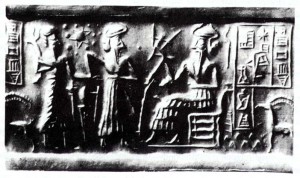 (earthling, Ninurta & Enlil giving 1st plow & the labor to mankind)
(earthling, Ninurta & Enlil giving 1st plow & the labor to mankind)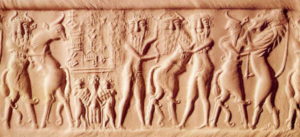 (earthlings prior to DNA modifications, non-workers)
(earthlings prior to DNA modifications, non-workers) 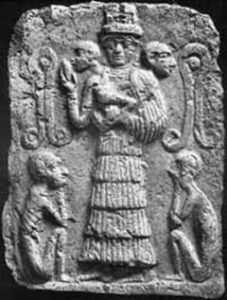 (Ninhursag with her failed early attempts to fashion workers, using manipulated DNA mixes)
(Ninhursag with her failed early attempts to fashion workers, using manipulated DNA mixes)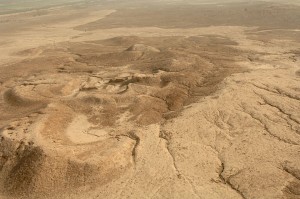 (areal view of Lagash ruins)
(areal view of Lagash ruins)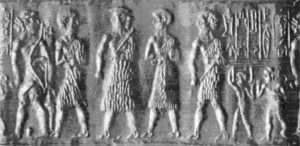 (King Eannetum in middle, Biblical “heroes of old, men of renown”)
(King Eannetum in middle, Biblical “heroes of old, men of renown”)
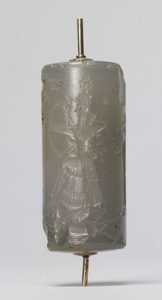 (warrior hero Ninurta / Ningirsu riding his winged beast, sky-craft in battle)
(warrior hero Ninurta / Ningirsu riding his winged beast, sky-craft in battle)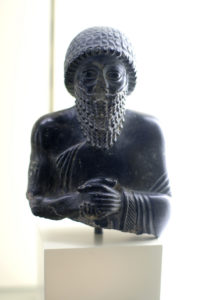 (Adad‘s semi-divine mixed-breed son-king Ur-Ningirsu, named after older brother Ningirsu / Ninurta)
(Adad‘s semi-divine mixed-breed son-king Ur-Ningirsu, named after older brother Ningirsu / Ninurta) 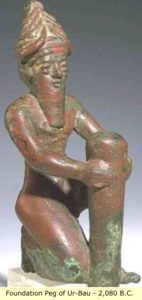 (4,000 year old foundation peg of Ur-Bau / Ur-Baba, figure of Ningishzidda, Architect of the ziggurats & pyramids)
(4,000 year old foundation peg of Ur-Bau / Ur-Baba, figure of Ningishzidda, Architect of the ziggurats & pyramids) 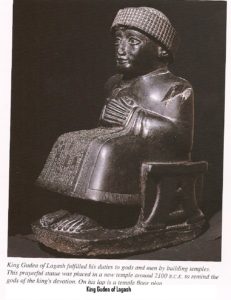 (giant mixed-breed king Gudea on his Lagash throne)
(giant mixed-breed king Gudea on his Lagash throne)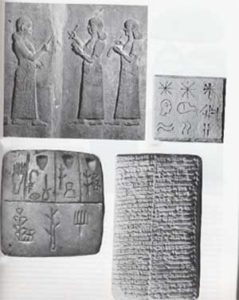 (Nisaba, Enlil‘s mother-in-law, Haia‘s spouse, Goddess of Scribes, Accounting, & Grains)
(Nisaba, Enlil‘s mother-in-law, Haia‘s spouse, Goddess of Scribes, Accounting, & Grains)